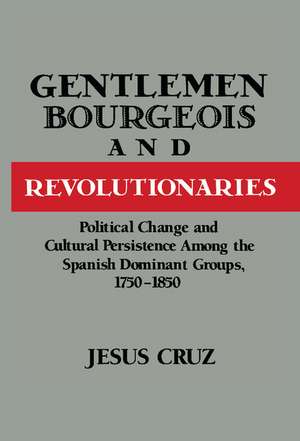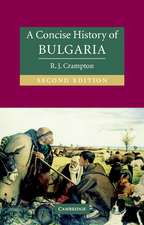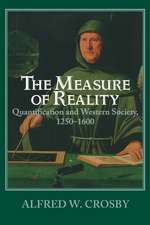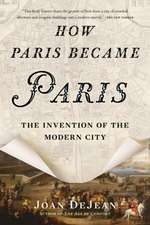Gentlemen, Bourgeois, and Revolutionaries: Political Change and Cultural Persistence among the Spanish Dominant Groups, 1750–1850
Autor Jesus Cruzen Limba Engleză Hardback – 25 ian 1996
| Toate formatele și edițiile | Preț | Express |
|---|---|---|
| Paperback (1) | 325.38 lei 6-8 săpt. | |
| Cambridge University Press – 28 ian 2004 | 325.38 lei 6-8 săpt. | |
| Hardback (1) | 757.37 lei 6-8 săpt. | |
| Cambridge University Press – 25 ian 1996 | 757.37 lei 6-8 săpt. |
Preț: 757.37 lei
Preț vechi: 880.66 lei
-14% Nou
Puncte Express: 1136
Preț estimativ în valută:
144.94€ • 149.53$ • 122.67£
144.94€ • 149.53$ • 122.67£
Carte tipărită la comandă
Livrare economică 04-18 martie
Preluare comenzi: 021 569.72.76
Specificații
ISBN-13: 9780521481984
ISBN-10: 0521481988
Pagini: 364
Ilustrații: 11 b/w illus. 36 tables
Dimensiuni: 152 x 229 x 24 mm
Greutate: 0.68 kg
Ediția:New.
Editura: Cambridge University Press
Colecția Cambridge University Press
Locul publicării:New York, United States
ISBN-10: 0521481988
Pagini: 364
Ilustrații: 11 b/w illus. 36 tables
Dimensiuni: 152 x 229 x 24 mm
Greutate: 0.68 kg
Ediția:New.
Editura: Cambridge University Press
Colecția Cambridge University Press
Locul publicării:New York, United States
Cuprins
Part I. Careers, Business and Fortunes: 1. Introduction; 2. Merchants; 3. Bankers; 4. Bureaucrats and professionals; 5. Politicians; Part II. The Museum of Families: Strategies of Reproduction: 6. Habitus, solidarity and authority; 7. Kinship, friendship and patronage; 8. Conclusion: rethinking the Spanish Revolution.
Recenzii
"Jesus Cruz offers convincing evidence with regard to the political and economic elite of Madrid, who largely dominated early liberal politics....This is an unusually stimulating and original dissertation-book, based on extensive prosopographical research, that makes a distinctive contribution to the social history of Spain. It merits broad attention and should provoke extensive new discussion and research on modern elites in other parts of the country as well." Stanley G. Payne, Journal of Social History
"This solidly researched monograph challenges conventional interpretations about the social and economic background of Spanish liberals....Through detailed analysis of family histories, Cruz has shown that the liberal revolution was accomplished by already well-established individuals who moved easily to dominate the institutions and economy of the liberal state....This study offers an original and well-researched interpretation of a complex question....It makes a positive contribution to the history of Spanish liberalism in its formative period." William J. Callahan, Canadian Journal of History
"...the volume demands and deserves careful attention to appreciate its data and the arguments constructed thereon." Gary W. McDonogh, American Historical Review
The work of Jesus Cruz constitutes a magnificent example of the analytical tensions produced in European historiography by the failure of the classic theory...of the bourgeois revolution." Isabel Burdiel, Journal of Modern History
"This solidly researched monograph challenges conventional interpretations about the social and economic background of Spanish liberals....Through detailed analysis of family histories, Cruz has shown that the liberal revolution was accomplished by already well-established individuals who moved easily to dominate the institutions and economy of the liberal state....This study offers an original and well-researched interpretation of a complex question....It makes a positive contribution to the history of Spanish liberalism in its formative period." William J. Callahan, Canadian Journal of History
"...the volume demands and deserves careful attention to appreciate its data and the arguments constructed thereon." Gary W. McDonogh, American Historical Review
The work of Jesus Cruz constitutes a magnificent example of the analytical tensions produced in European historiography by the failure of the classic theory...of the bourgeois revolution." Isabel Burdiel, Journal of Modern History
Descriere
Revises the traditional interpretation of the crisis of the Spanish Old Regime as a revolution carried out by an ascendant bourgeoisie.












